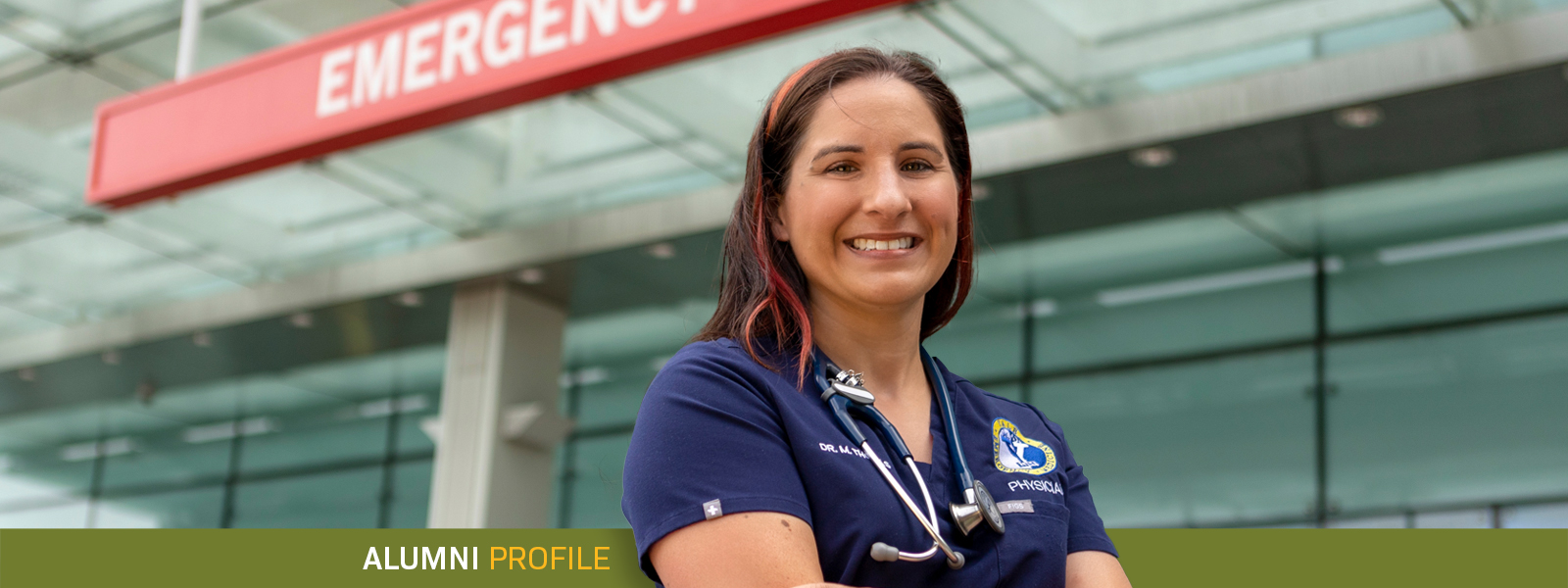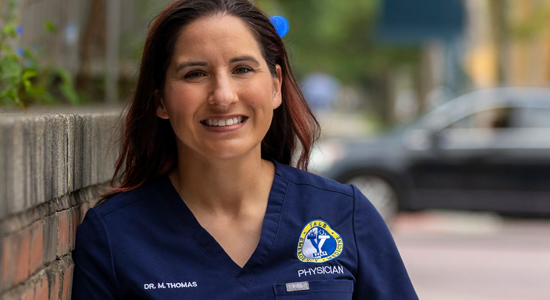All About the Pluses
Melissa Thomas always searches for the silver linings, even in the darkest days
By Justin Walker
For Melissa Thomas, it has always been about helping others. From a young age, Thomas had an interest in medicine and solving problems. It was a combination of serving others and an interest in being a self-described “mad scientist” that propelled Thomas toward her career.
Growing up in Plymouth, Massachusetts, Thomas was a typical high school student. She enjoyed sports and was pretty good when it came to academics. One of her teachers noticed a particular trait about her and suggested looking into a military academy for college.
Thomas took the suggestion and visited the U.S. Military Academy in West Point, New York. If she was going to attend one of the academies, she knew from the start that it would be West Point or nothing. There, she watched as cadets played a game of ultimate Frisbee when the cannon went off for Reveille.
Melissa Thomas, MBA/MHA ’12
Emergency Medicine Physician Resident; Yale New Haven Hosp.
New Haven, Connecticut
“They immediately stopped mid-throw in the middle of the game and all turned to salute the flag,” she said. “That floored me. I am such a competitive person and into sports that the fact they would all stop in the middle of playing and all recognize something bigger than themselves—it connected with me.”
Thomas chose West Point over other competitive programs at Duke and Harvard because there was something special—there was a good education plus an opportunity to challenge herself physically. The experience would prepare her well as she intended to go straight to medical school upon graduation.
During her sophomore year, 9/11 occurred. She witnessed others deploying overseas and she knew she wanted to be a part of that experience. She deferred her medical school acceptance and joined the Medical Service Corps (MSC) in 2004. A year later, her unit deployed to Iraq.
Thomas continued to rise in the ranks and on her second deployment, she served as a company commander over roughly 100 people in three different locations across Iraq. Rising in the ranks of the MSC allows for specialization, she said. Thomas wanted a bit of everything, though, so she specialized in general hospital administration. This led her to Baylor, where she enrolled in the Army-Baylor Program in San Antonio to obtain a dual MBA/MHA degree.
“It is a top-notch program,” Thomas said. “If you were to go to a different civilian school, you wouldn’t necessarily get to learn some of those intricacies on top of the typical economics and financial courses. Plus, the connections you make from having your cohort of other people who are in the federal healthcare system—those are your friends for life.”
The second year of the program sent Thomas to Fort Carson in Colorado Springs, Colorado, to complete her administrative residency. She was learning everything about healthcare administration and she noticed how she could help people from this career. But deep down, there was still a spark to return to her medical school plans. She began studying and applying for med schools when tragedy hit.
Thomas’ husband, whom she married in 2004, died unexpectedly on New Year’s Eve 2014. It could have derailed her plans, but instead, she found inspiration in the darkness. She was accepted into Yale School of Medicine, where she graduated in May 2020. Now in her second year of residency, she emphasizes learning from her experiences and sharing her and her husband’s story to help others.
“I feel like I’ve had this interest in how society deals with death and those end-of-life conversations just having had to deal with the grieving process,” she said. “It is something I’ve reflected on a lot throughout medical school.”
Those types of conversations are rare in our society, Thomas said, but they will eventually be dealt with. It is better to think about it now so people are prepared before they end up talking to family members in the emergency room in moments of crisis, she said.
“I feel like that’s an interest of mine—continuing to try and change our culture about death,” Thomas said. “That is something I’ve tried to figure out how I can continue to have that conversation and make that impact.”


